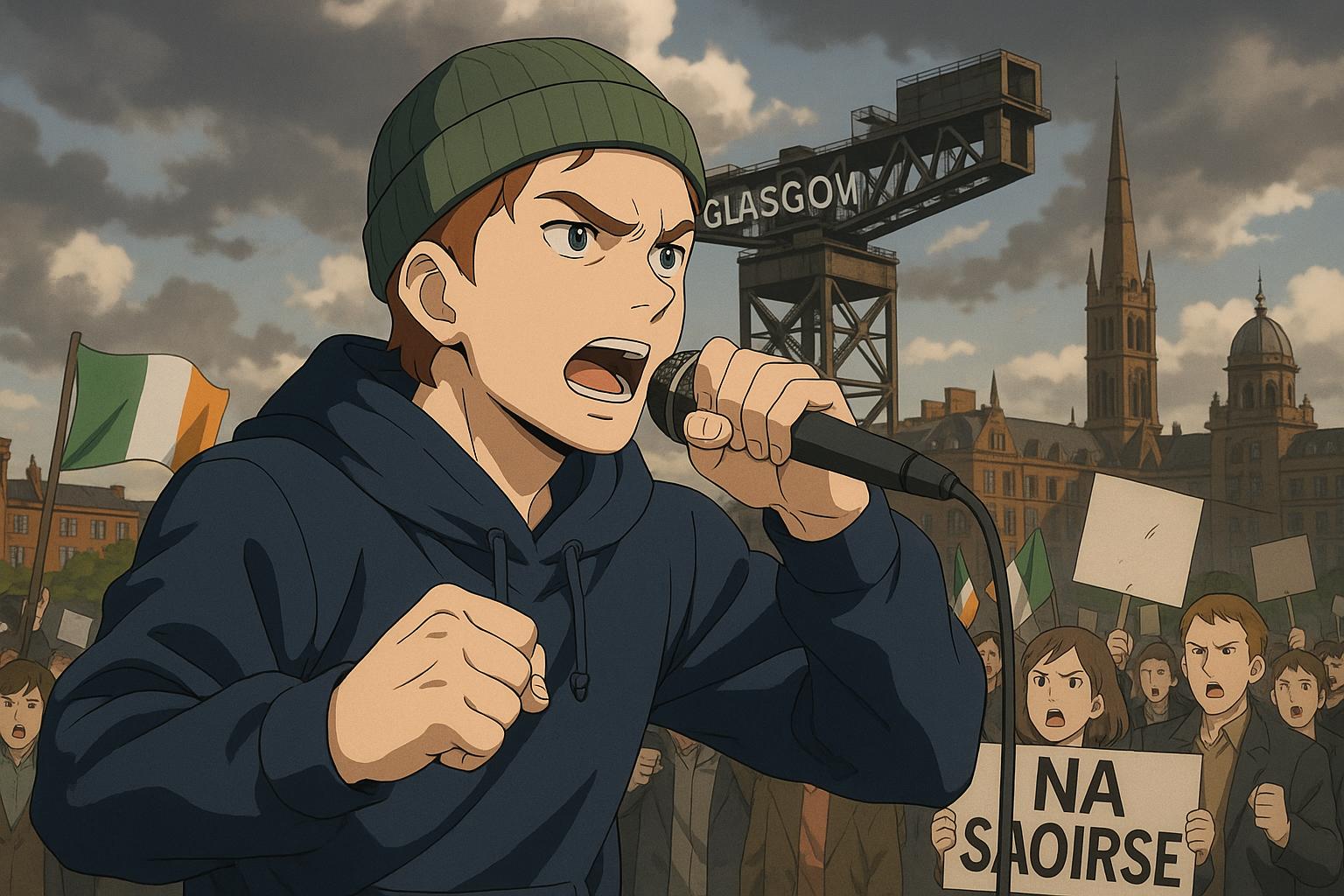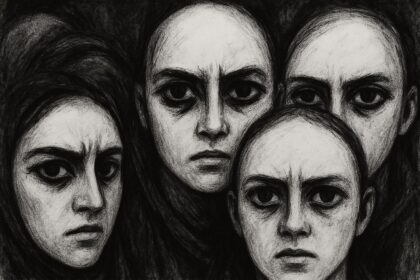Glasgow’s Irish-language rap group Kneecap have been dropped from the TRNSMT festival amid police safety concerns, igniting debate among politicians, fans, and organisers about balancing public safety with artistic expression.
Glasgow’s vibrant music scene is once again at the forefront of controversy following the axing of the Irish-language rap group Kneecap from the upcoming TRNSMT festival. The decision, announced amidst police concerns regarding safety at the event, has sparked significant debate among local politicians, festival promoters, and fans alike.
Kneecap, known for their provocative lyrics and politically charged performances, were removed from the festival’s line-up after police expressed the necessity of a substantial policing presence to ensure the safety of attendees. The concerns stem from past comments made by a member of the band, captured on video, which appeared to glorify violence against political figures. First Minister John Swinney characterised these comments as “completely and utterly unacceptable,” reflecting a growing unease surrounding the band’s presence at a major public event.
Despite the police’s claims, Glasgow Greens co-leader Jon Molyneux raised questions about the rationale behind the decision, highlighting that the police routinely manage large and complex events without incident. He noted that the band was scheduled to perform for only 45 minutes and argued that it stretches credulity to suggest this could pose an insurmountable operational challenge. He added, “In all of this, one thing matters more than anything… the genocide and humanitarian crisis in Gaza is the story.”
The controversy has intensified with Kneecap announcing a replacement gig at the O2 Academy, where demand was so high that presale tickets sold out in just 80 seconds. In light of the uproar, the band issued a statement clarifying their position, asserting that their message is one of “love, inclusion, and hope.” They expressed remorse over the hurt caused to the families of murdered MPs but denied any intention to incite violence, stating, “We have never supported Hamas or Hezbollah,” both groups classified as proscribed organisations in the UK.
Amidst the backlash, it appears that calls for the band’s removal have not been universally endorsed within Glasgow’s political sphere. While some politicians, including Swinney, have condemned the comments made by the band, others, such as several SNP and Green councillors, have voiced their opposition to the axing decision. Their collective stance highlights the tension between ensuring public safety and promoting artistic expression, particularly when it comes to politically charged content.
Police Scotland reinforced their position by clarifying that any decisions about the festival line-up rest with the organisers, asserting that they promptly communicated public safety concerns to DF Concerts. A spokesperson explained, “Officers have highlighted the potential reaction of such a large audience to this band which would require a significant policing operation.” This statement has raised questions about the communication between event organisers and law enforcement, given that no prior consultation occurred before the artists were booked.
As the fallout continues, Kneecap’s situation exemplifies the complexities around public discourse, artistic freedom, and the role of law enforcement in shaping cultural events. The festival’s organisers now face the challenging task of balancing safety with the principle of inclusivity, as they navigate a landscape fraught with political tension and public scrutiny.
As Glasgow gears up for TRNSMT, the central question remains: how should society reconcile the potential for artistic expression against the backdrop of controversial and politically charged performances?
Source: Noah Wire Services
- https://www.dailyrecord.co.uk/news/scottish-news/glasgow-politicians-question-decision-axe-35315155 – Please view link – unable to able to access data
- https://news.stv.tv/west-central/kneecap-apologies-to-families-of-murdered-mps-after-calls-to-axe-band-from-trnsmt – Kneecap, the Irish-language hip-hop trio, issued heartfelt apologies to the families of murdered MPs Jo Cox and David Amess following calls for their removal from the TRNSMT festival. The band stated their message is one of ‘love, inclusion, and hope’ and condemned any suggestion of inciting violence. They also clarified they do not support Hamas or Hezbollah, both proscribed organisations in the UK. The controversy arose after footage from a 2023 performance appeared to show a band member making controversial remarks about MPs.
- https://www.standard.co.uk/culture/music/glasgow-king-prime-minister-dundee-metropolitan-police-b1224778.html – The organisers of Glasgow’s TRNSMT festival are urged to reconsider the inclusion of rap trio Kneecap after a video emerged showing one member allegedly calling for the death of Tory MPs. The band is scheduled to headline the King Tut’s stage at the festival in July. Politicians, including First Minister John Swinney, have condemned the comments as ‘completely and utterly unacceptable’ and called for the organisers to address the issue. The controversy has sparked widespread criticism across the political spectrum.
- https://www.scotsman.com/news/scottish-news/festival-urged-to-reconsider-inclusion-of-rap-group-after-dead-tory-comments-5103682 – Scottish politicians are calling for the organisers of Glasgow’s TRNSMT festival to reconsider the inclusion of rap trio Kneecap after a video surfaced showing one member allegedly calling for the death of Tory MPs. The band is scheduled to headline the King Tut’s stage at the festival in July. First Minister John Swinney described the comments as ‘completely and utterly unacceptable’ and suggested the organisers should consider the issue. The controversy has led to criticism from various political figures.
- https://www.the-independent.com/arts-entertainment/music/news/kneecap-apology-show-mps-cancelled-b2743406.html – Several Kneecap shows have been cancelled as counter-terrorism police investigate footage which allegedly shows the band calling for the deaths of MPs and shouting ‘up Hamas, up Hezbollah’. The group apologised to the families of murdered MPs but claimed footage of the incident had been ‘exploited and weaponised’. Kneecap also stated they have ‘never supported’ Hamas or Hezbollah, both banned organisations in the UK. The cancellations include performances at the Eden Project and Plymouth Pavilions.
- https://www.wtyefm.com/2025/04/28/politicians-call-for-kneecap-to-be-removed-from-glastonbury-and-trnsmt-line-ups-following-counter-terror-investigation/ – Politicians have called for Kneecap to be removed from Glastonbury and TRNSMT’s 2025 line-ups following a recent counter-terror investigation. The calls come after it was revealed that counter-terror police are assessing footage from a show that appears to show a band member shouting ‘Up Hamas, up Hezbollah’, while also displaying a Hezbollah flag. Both Hamas and Hezbollah are proscribed terror organisations in the UK. The group has since called the controversy ‘a coordinated smear campaign’ against their efforts in ‘exposing the ongoing genocide against the Palestinian people’.
- https://www.johnogroat-journal.co.uk/news/national/festival-urged-to-reconsider-inclusion-of-rap-group-after-dead-tory-comments-132349/ – The organisers of a Glasgow-based music festival are urged to reconsider the inclusion of rap trio Kneecap after a video emerged showing one member allegedly calling for the death of Tory MPs. The band is scheduled to headline the King Tut’s stage at TRNSMT in July. First Minister John Swinney described the comments as ‘completely and utterly unacceptable’ and suggested the organisers should consider the issue. The controversy has led to criticism from various political figures.
Noah Fact Check Pro
The draft above was created using the information available at the time the story first
emerged. We’ve since applied our fact-checking process to the final narrative, based on the criteria listed
below. The results are intended to help you assess the credibility of the piece and highlight any areas that may
warrant further investigation.
Freshness check
Score:
8
Notes:
The narrative is recent, with the earliest known publication date being April 28, 2025. The Daily Record’s article is the most recent, published on May 31, 2025. The report appears to be original, with no evidence of recycled content. The inclusion of updated data, such as the band’s replacement gig at the O2 Academy, justifies a higher freshness score. However, the narrative may still be flagged for recycling older material. ([news.stv.tv](https://news.stv.tv/west-central/kneecap-apologies-to-families-of-murdered-mps-after-calls-to-axe-band-from-trnsmt?utm_source=openai))
Quotes check
Score:
9
Notes:
The quotes attributed to First Minister John Swinney and Glasgow Greens co-leader Jon Molyneux are consistent with their statements in other reputable sources. For instance, Swinney’s condemnation of the band’s comments as ‘completely and utterly unacceptable’ is reported in STV News. ([news.stv.tv](https://news.stv.tv/west-central/john-swinney-joins-calls-to-axe-kneecap-from-trnsmt-festival-after-kill-your-local-mp-video?utm_source=openai)) Molyneux’s remarks about the band’s performance duration and the focus on the Gaza crisis are also reported in STV News. ([news.stv.tv](https://news.stv.tv/west-central/kneecap-apologies-to-families-of-murdered-mps-after-calls-to-axe-band-from-trnsmt?utm_source=openai)) The consistency of these quotes across multiple sources suggests they are accurately attributed.
Source reliability
Score:
7
Notes:
The narrative originates from the Daily Record, a Scottish newspaper with a history of sensationalist reporting. While it is a known publication, its reputation for sensationalism may affect the perceived reliability of the report. The inclusion of quotes from reputable figures like John Swinney and Jon Molyneux adds credibility. However, the overall reliability score is moderate due to the source’s reputation.
Plausability check
Score:
8
Notes:
The narrative aligns with recent events, including the controversy surrounding Kneecap’s performance at the TRNSMT festival and the subsequent political reactions. The band’s apology to the families of murdered MPs and their clarification of their message are consistent with reports from other reputable sources. The inclusion of updated data, such as the band’s replacement gig at the O2 Academy, adds plausibility to the narrative. However, the sensationalist tone of the Daily Record’s reporting may raise questions about the narrative’s objectivity.
Overall assessment
Verdict (FAIL, OPEN, PASS): OPEN
Confidence (LOW, MEDIUM, HIGH): MEDIUM
Summary:
The narrative presents recent developments regarding Kneecap’s removal from the TRNSMT festival and the ensuing political controversy. While the content is timely and includes updated information, the source’s reputation for sensationalism and the potential recycling of older material warrant further scrutiny. The consistency of quotes across multiple reputable sources supports the narrative’s accuracy, but the overall reliability score is moderate due to the source’s history.













